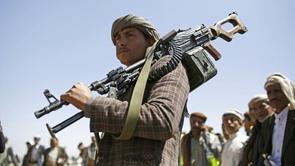 In this Sept 21, 2019 photo, a Shi'ite Houthi tribesman holds his weapon during a tribal gathering showing support for the Houthi movement, in Sanaa, Yemen. (HANI MOHAMMED / AP)
In this Sept 21, 2019 photo, a Shi'ite Houthi tribesman holds his weapon during a tribal gathering showing support for the Houthi movement, in Sanaa, Yemen. (HANI MOHAMMED / AP)
DUBAI - The Saudi-led coalition engaged in Yemen said that implementation of a long-delayed deal aimed at reuniting its Yemeni allies would start on Thursday with a troop redeployment in the south ahead of announcing a new power-sharing government.
The agreement, first announced in November and revived in July, was brokered by Riyadh to end a standoff between Yemen’s internationally recognised government and southern separatists who are both part of the coalition that has been battling the Iran-aligned Houthi movement since 2015.
The agreement, first announced in November and revived in July, was brokered by Riyadh to end a standoff between Yemen’s internationally recognised government and southern separatists who are both part of the coalition that has been battling the Iran-aligned Houthi movement since 2015
ALSO READ: Saudi-led coalition announces ceasefire in five-year Yemen war
The separatist Southern Transitional Council (STC), whose forces are backed by Riyadh’s ally the United Arab Emirates, has been locked in a power struggle with the Saudi-backed government in the south, where it has been based since being ousted from power in the capital, Sanaa, by the Houthis in late 2014.
The coalition said in a statement it would on Thursday start supervising the separation of forces in Abyan governorate to return to battlefronts with the Houthis and from inside Aden port city to outside the governorate.
It said consensus had been reached on a new cabinet of 24 ministers, including from STC and Yemeni “political components”, and that the government would be announced “as soon as implementation of the military aspect is completed within one week”.
READ MORE: Donors, aid groups plan to suspend Yemen aid to Houthi areas
The dispute within the anti-Houthi camp was one factor holding up United Nations efforts to negotiate a nationwide ceasefire to pave the way for a resumption of political negotiations, last held in December 2018, to end the wider war.
The conflict, seen widely in the region as a proxy war between Saudi Arabia and Iran, has killed more than 100,000 people and caused what the United Nations says is the world’s largest humanitarian crisis.
The Houthis, who hold Sanaa and most big population centres, deny being puppets of Iran and say they are fighting a corrupt system.


